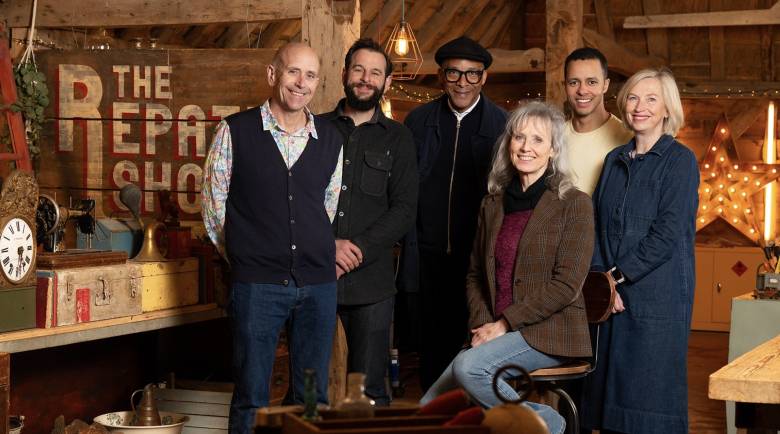In August of 1960 four men stood on a bare stage in plain dark clothing and, relying on nothing but the sheer force of their intelligence and talent, took British comedy to a whole new level.
This comedic gang of four was comprised of Dudley Moore, Alan Bennett, Jonathan Miller and Peter Cook. They performed a revue called Beyond the Fringe, which heralded the beginning of a satire boom that would dominate British comedy during the early 60s.
The title is a reference to the Edinburgh Festival, an annual celebration of the arts held in the Scottish capital. Along with the official showcases held during the festival, there are also unofficial performances by more experimental groups. These are considered to be on the “fringe” of the festival and winning one of the awards presented to fringe acts is considered a very prestigious honor even to this day.
Beyond the Fringe was definitely beyond the norm. Experimental and risky, it would forever broaden the scope of what was considered acceptable humor in Britain. In other words, anything and anyone was now fair game.
Peter Cook became the first comic in years to impersonate a standing Prime Minister when he lampooned Harold Macmillan. Cook even went above and beyond the usual skit one evening when Macmillan himself was in the audience, causing the PM to bury his head in his program.
Alan Bennett became one of the few people to say the word “erection” in front of the Queen when she came incognito to see the show. Bennett had been informed of the Queen’s presence, but still refused to take out the questionable word.
The quartet trashed classical music, religion, war and every other sacred cow. However, Beyond the Fringe was not all social commentary. Indeed, their main purpose was simply to be funny and satire was just one of their weapons. In a brilliant parody of the Bard, Miller played a King who in a flurry of Shakespearean verse sent his mignons off to battle. He ended this long-winded speech with the memorable lines, “I most royally shall now to bed/To sleep off all the nonsense I’ve just said.”
The Beyond The Fringe Boys – Jonathan Miller, Alan Bennett, Dudley Moore and Peter Cook.There was also the introduction of a skit that would become a Cook/Moore staple. It was called One Leg Too Few and featured Moore as an actor auditioning for the part of Tarzan. Problem is, he only has one leg and as Cook points out, Tarzan is “a role, which, traditionally involves the use of a two-legged actor.”
Beyond the Fringe would have a long run on the London stage and also become the darling of the intelligentsia when it ran in New York.
The rebellious roots of Beyond the Fringe actually took seed in the very traditional university atmosphere of Cambridge and Oxford. Cambridge was especially influential thanks to its Footlights Club, a dramatic society that has been in existence since the late 1800s. During the 60s its roster was truly a look into the future of British comedy. Just a few of its members were:
• Three future members of Monty Python – John Cleese, Graham Chapman and Eric Idle.
• Two of the Beyond the Fringe gang – Jonathan Miller and Peter Cook.
• Tim Brooke-Taylor and Graeme Garden, who would later team up with Bill Oddie to form The Goodies.
• Television personality David Frost.
• Future National Lampoon editor Tony Hendra, who also played the manager of Spinal Tap in the classic “mockumentary” This Is Spinal Tap.
• Jonathan Lynn and Antony Jay, who would later put their satirical pens to work and write Yes, Minister and Yes, Prime Minister.
• Eleanor Bron, who would save The Beatles as Princess Ahmed in Help! and play Patsy’s hippy dippy mother on Absolutely Fabulous. Bron was one of the first women in The Footlights, which for decades only permitted men.
The main purpose of the Footlights is to write a revue that is performed at the end of the term in June. The revues have a two-week run at the school and some of the past productions were good enough to transfer to the West End. The 1963 revue, Cambridge Circus, with a cast including Cleese and Chapman, even had a brief run on Broadway and the cast appeared on The Ed Sullivan Show.
Meanwhile, Oxford also had a strong tradition of theatrical productions that provided a training ground for the likes of Dudley Moore, Terry Jones and Michael Palin.
This “Oxbridge Mafia” would dominate British comedy during the 60s and oddly enough, all of them entered show business via a somewhat circuitous route. Cook studied French and German. Miller and Chapman were both trained doctors. Cleese was set to join a law firm. Yet their “extracurricular activities” caused their lives to take a different path and they infiltrated the world of show business. Once they arrived, things would never be the same.
Satire Widens Its Influence
Beyond the Fringe was only the beginning and satire became the name of the game. Peter Cook took things once step further by opening a club called The Establishment, based on the cabaret clubs he’d been to in Germany and France. The Establishment offered its patrons a mixture of politically conscious comedy and music with most of the sketches targeted against the government, bureaucrats, and the “establishment” itself. Cook even arranged a performance by the controversial American comedian Lenny Bruce.
The publishing world also jumped on the satire bandwagon with the creation of Private Eye magazine. This venerable publication is still in existence today lampooning celebrities, politicians and current events. One of the magazine’s earlier contributors was an Australian called Barry Humphries, who would later go on to fame as Dame Edna Everage. Political satire reached its peak – as well the masses outside of London – with the television series That Was The Week That Was, or as it was more commonly called, TW3.
This was a loosely knit conglomeration of sketches, monologues and musical numbers linked together by David Frost. Thanks to the ground broken by Beyond the Fringe, TW3 had no qualms about savagely skewering politicians, powerful public figures, and even – gasp – Royalty. The show lucked out also when during its run the Profumo scandal broke. The writers had a field day with the story, which involved call girls, orgies, and high-level officials in both the British and Russian government. This scandal would have far-reaching repercussions, including the resignation of PM Harold Macmillan.
TW3 was an instant hit and the BBC finally seemed to be getting away from its rather staid image. In the process, however, the Beeb lost some of the political neutrality it’s supposed to demonstrate. TW3 was influencing and impacting the opinion of a lot of people, so when a general election was held in 1964 the BBC was persuaded to keep it off the air. It never returned.
An American version of TW3 ran for a couple of years and paved the way for such politically conscious shows as The Smothers Brothers Comedy Hour and even Saturday Night Live.
With the end of TW3 the satire boom ostensibly went bust, but its main participants continued to thrive. Alan Bennett concentrated on writing and has since become one of Britain’s most esteemed playwrights. Jonathan Miller has done directing and producing, putting his unique stamp on everything from Shakespeare to television documentaries.
Peter Cook and Dudley Moore, however, went on to become one of British comedy’s all time great double acts. The duo teamed up for three seasons of Not Only…But Also, which consisted of sketches, filmed items and a guest spot. The highlight of the series was a number of conversations that became known as the “Dud and Pete” dialogues. Both would appear wearing similar trench coats and hats and pretend to talk authoritatively about things neither of them knew much about, so it was a case of the blind leading the blind. In one such dialogue, Pete attempts to educate Dud about women by recounting his “tempestuous affair” with a woman on the number 42B bus route.
Dud: They’ve discontinued that route, haven’t they, Pete?
Pete: Yes, due to the incident I’m about to relate. I used to go on the 42B, I think it was spring of 1948, anyway, one day I got on the bus – you know, perfectly normal – sat down, uneventfully, the bus started up, went on a stop, stopped, nobody got on, nobody got off, bell rang, the bus started up again, went to another stop, nobody got on, nobody got off, the bell rang, the bus went another stop, nobody got on, nobody got off…
Dud: How long’s that go on for, Pete?
Pete: About five stops, Dud – it was a fairly uneventful journey until the incident. I won’t bore you with the details –
Dud: You already have, Pete
The dialogue ends up with Pete’s advice to Dud that you have to play it cool with women. In fact, he played it so cool with the tempestuous beauty on the 42B bus that she got off without even looking at him and he never saw her again.
In the following years Cook and Moore did solo work and reunited from time to time for television and movies such as Bedazzled, a Faustian tale that was recently updated with Brendan Fraser and Elizabeth Hurley in the lead roles. They also tested the boundaries of good taste via the crude characters of Derek and Clive.
Moore also found international acclaim as the beloved star of the movies 10 and Arthur. Speculation has always been that Cook was despondent and jealous over his former colleague’s worldwide success, and it has to be said that for all of Cook’s fame in the UK, his genius deserved to be better known and appreciated outside of his native country. He was a master of the nonsensical monologue as epitomized in such characters as E. L. Wisty. Alan Bennett
once remarked that Cook was “an accurate observer of mad thought,” and that sums him up perfectly.
Satire in the Sitcom
The satire boom, with its cynicism, harshness, and slaughtering of sacred cows, led the way for such classic TV programs as Steptoe and Son and Till Death Us Do Part.
Steptoe was the story of father and son junk dealers trying to survive their miserable existence and each other. If this sounds familiar it’s because it formed the basis for one of the most successful of the Brit-American translations: Sanford and Son.
However, Steptoe, which began its run in 1962, was a darker series than its American counterpart. Wilfrid Brambell (who played Paul McCartney’s “clean” grandfather in A Hard Day’s Night) was Albert Steptoe, a man who did everything he could to make sure that his son Harold (Harry H. Corbett) was around to help him. This meant that Harold had to be kept away from all distractions, especially of the female variety.
Steptoe became a British institution not only due to the strength of its two lead actors but also thanks to the scripts provided by one of British comedy’s most prolific writing teams: Ray Galton and Alan Simpson. Their subject matter had at its core the father/son relationship, but Galton and Simpson also tackled issues such as homosexuality and illegitimacy.
Till Death Us Do Part created even more of a stir and still remains one of the most controversial sitcoms ever to grace the British airwaves. The bigoted, right wing, Tory voting Alf Garnett would later prove the inspiration for Archie Bunker when Till Death Us Do Part became the model for All in the Family.
Writer Johnny Speight intended Alf to lampoon ultra- conservative views, but there were some people who just didn’t get the joke and instead saw Alf as a role model. Conservative activist and moral watchdog Mary Whitehouse registered frequent complaints and initiated legal proceedings against the BBC because of the show’s frank discussions of sex and religion. Mrs. Whitehouse would later become a thorn in the side of Monty Python when they released Life of Brian.
1968 came up with another winner giving Britons a fond look at their “greatest hour” in Dad’s Army. Although a gentler, less controversial comedy than either Steptoe or Till Death, there was an innate bravery in the decision to make Dad’s Army. After all, this was a sitcom set during a period of history that probably still caused pain among some of the population.
The setting was Walmington-on-Sea during WWII and the main characters were a fairly inept squadron of volunteers in The Home Guard. In case of an emergency these were the guys who would keep you safe from the German army…maybe.
The sometimes touching, always funny scripts were helped along by a cast that still stands out as one of television’s great ensembles. Arthur Lowe’s grumpy, pompous Captain Mainwaring, John Le Mesurier’s cool, in control Sergeant Wilson, Clive Dunn’s loveable Lance Corporal Jack Jones, and the rest were able to bring out the necessary blend of slapstick and lunacy.
The show also became responsible for a number of catchphrases such as Mainwaring’s “Stupid boy,” directed at the young Pike, and “Don’t panic!,” said by Jones in a manner that made you want to do just that.
Dad’s Army earned a warm place in the hearts of most British people and it continued its march into television history until 1977.
On The Radio
Even today, radio plays a bigger role in the British entertainment industry than in the American. Many successful television programs have started out as radio shows and it is also not uncommon for television shows to record episodes for radio broadcast. Dad’s Army and As Time Goes By are just two examples.
In the 60s, the most popular radio show was I’m Sorry I’ll Read That Again. The title refers to the phrase uttered by BBC announcers when they make an error.
ISIRTA was the revue format brought to radio, containing monologues and sketches along with song parodies contributed by Bill Oddie. The rest of the cast included John Cleese (who had just returned from an extended stay in the States), Tim Brooke-Taylor and Graeme Garden. On the writing staff were such notables as Bob Larbey and John Esmonde, who would later create Good Neighbors and Mulberry.
ISIRTA relied heavily on puns, old gags, and just plain silliness. Consider this brief extract from a conversation between babies in their carriages:
Rupert: Morning, Cyril – what’s the trouble? Cyril: Just bewailing my lost youth.
Rupert: But you’re only one.
Cyril: Yes, but in forty-nine years I shall be fifty.
Imagine – I’m nearly fifty! Then it’s but a step ‘till I’m a hundred and three. And then I won’t be able to walk.
Rupert: Well, you can’t walk now!
The show was an enormous hit and the studio audience became vocal and practically a part of the show, heckling the actors and greeting recurring character with thunderous ovations.
Two of the more popular regular characters were John and Mary, a husband and wife played by Cleese and Jo Kendall. Their relationship is obviously falling apart, as seen in the following exchange:
John: Ah, how I love to be alone in the country. Mary: John?
John: Yes?
Mary: I’m with you.
John: How I love to be alone in the country. Mary: But John – you brought me with you! John: I didn’t – you hid in the back.
Mary: But you must have noticed.
John: Not at all – it’s a very large tandem.
With breaks, the show would remain on the air for ten years. During the interruptions, its stars would keep busy with other projects.
Meanwhile, Back On the Telly…
David Frost was becoming an international celebrity and decided to put together another show in somewhat the same vein as TW3. Minutes before boarding a plane in New York he placed a call to John Cleese, who quickly agreed to be a writer and performer on Frost’s new project.
The Frost Report featuring Ronnie Barker and Ronnie Corbett.The Frost Report and is now remembered mainly for the fact that it brought together all the members of Monty Python (except Terry Gilliam) for the first time. It also gave an early indication of the writing partnerships that would follow them into Python. Two of the Cambridge men (Cleese and Chapman) wrote together as did the Oxford duo of Palin and Jones. Idle, as would become his norm, wrote on his own.
The Frost Report was a success and should have been one seeing that the best comedy talent in the UK was involved in one way or another. Frost again served as the “link man” and other main performers included Ronnie Corbett and Ronnie Barker. The tiny Corbett and the corpulent Barker would go on to great success as double act called The Two Ronnies.
It was always a source of amusement among the staff that the program was credited as “Written by David Frost,” which was really overstating the case since most of it was done by a large group of contributors. As Cleese once said, “Chosen by David Frost – fair enough!” Eric Idle got back at his former boss years later, however, with his merciless parody of Frost in the guise of show biz personality Timmy Williams. Nevertheless, Frost was extremely important in the career development of many people at that time.
One of the breakout talents from The Frost Report was head writer Marty Feldman. Feldman was an odd-looking man with protruding eyes, but a very talented writer who’d worked on several radio shows. After The Frost Report ended its run, Frost persuaded the BBC to let Feldman in front of the cameras.
At first there was considerable hesitancy. The network couldn’t see the rich comic possibilities in Feldman’s face and thought only that it would put viewers off. Yet they took a chance and At Last The 1948 Show premiered in 1967, with Feldman, Cleese and Chapman as regulars and a few appearances by Idle.
This was the start of a successful, but all too brief, career for Feldman, who would later move to the United States and star in his own show, The Marty Feldman Comedy Machine. He also became a crony of Mel Brooks, appearing in Silent Movie and Young Frankenstein. Tragically, he suffered a massive heart attack and died in 1982 while filming Yellowbeard with Graham Chapman. He was only 49 years old.
At Last the 1948 Show was not only important for Feldman, but also served as a significant stepping-stone in the development of Monty Python. The freedom that the cast was allowed caused them to follow the lead set by Spike Milligan in his series Q5 and move further away from what Cleese referred to as “the tyranny of the punch line.”
Other Popular Stars
Other 60s personalities included Benny Hill, whose visual,bawdy humor combined with the “T and A” factor provided by his sidekicks, the “Hills Angels,” turned him into a worldwide celebrity.
He was born Alfred Hawthorne Hill and began appearing on the BBC in the early 50s. In the following decade he hit his stride with The Benny Hill Show. His leering style and bevy of beauties have become Hill’s legacy, but it tends to overshadow the fact that he was a talented impersonator and comic actor. However, his emphasis on visual humor is what allowed him to gain a worldwide audience, much like Rowan Atkinson would do decades later with Mr. Bean.
His type of humor, with its perceived sexism and old school “mother-in-law” type gags, went out of style during the politically correct atmosphere of the 80s, but Hill continued to work until shortly before his death from a heart attack in 1992. As much as they tried, the alternative comics who wanted to discredit him never succeeded, and his popularity to this day proves that there will always be an audience for his bawdy, broad style of humor.
Frankie Howerd in Up PompeiiThe other King Leer during the 60s was Frankie Howerd, who in 1968 starred in the first season of his hit series Up Pompeii! The humor was lowbrow and full of innuendo, but Up Pompeii! was not about the script or the plot – it was all about allowing Howerd to break that “fourth wall” and talk to viewers. Howerd, playing a Roman slave named Lurcio, frequently stepped out of character to quip about everything from his health to the poor quality of the scripts. It was revealed after Howerd’s death that these asides, which seemed so spontaneous, were actually scripted by the writers and very rarely ad-libbed. Nevertheless, it takes a strong, likable performer to pull off this type of thing and Howerd made it work beautifully. Like Benny Hill, Howerd had a number of ups and downs during the course of his long career, but his talent and body of work are still highly regarded.
So, To Sum It All Up…
Britain in the 60s was much like America at that time, going through a tumultuous period that would transform it forever. Comedy reflected these changes and was all over the map, from the cerebral, cultured refinement of an Alan Bennett to the lowbrow farce of a Benny Hill, from the politically conscious, topical satire of Beyond The Fringe to the nostalgia of Dad’s Army.
The comedy scene began the decade dominated by a gang of four, but ended it dominated by a gang of six. More about them next time when The History of British Comedy moves into the 70s.












